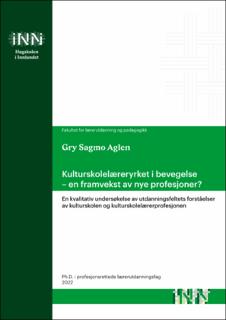| dc.contributor.author | Aglen, Gry Sagmo | |
| dc.date.accessioned | 2022-02-23T14:09:04Z | |
| dc.date.available | 2022-02-23T14:09:04Z | |
| dc.date.issued | 2022 | |
| dc.identifier.isbn | 978-82-8380-328-0 (trykt) | |
| dc.identifier.isbn | 978-82-8380-329-7 (digital) | |
| dc.identifier.issn | 2464-4390 (trykt) | |
| dc.identifier.issn | 2464-4404 (digital) | |
| dc.identifier.uri | https://hdl.handle.net/11250/2981069 | |
| dc.description | © Gry Sagmo Aglen 2022. | en_US |
| dc.description.abstract | Denne studien er en kvalitativ undersøkelse av musikkpedagogiske utdanninger som kvalifiserer til undervisning i kulturskolen, der forståelse er et nøkkelbegrep som binder sammen teori, empiri og resultater. Studiens overordnede problemstilling er Hvilke forståelser av kulturskolen og kulturskolelærerprofesjonen ligger til grunn i musikkpedagogisk rettede programmer som kvalifiserer til undervisning i kulturskolen?
Bakgrunnen for tematikken i avhandlingen er kulturskolelærerprofesjonens mangfoldige karakter og hvordan utdanningsinstitusjoner intenderer å kvalifisere sine studenter til utøvelse av denne profesjonen og hvordan kvalifiseringen foregår. Problemstillingen er undersøkt ved hjelp av fem forskningsspørsmål, og disse er behandlet separat i tre artikler. Første artikkel omfatter dokumentstudier av studieregulerende dokumenter og kulturskolens rammeplan sett i lys av profesjonsteori. I artikkel nummer to beskrives en intervjustudie av kulturskolelærerutdannere fra sju ulike utdanningsinstitusjoner i Norge, og profesjonsteori utgjør artikkelens teoretiske fundament. Den tredje artikkelen omfatter observasjoner av praksisundervisning og praksissamtaler knyttet til to ulike musikkpedagogiske utdanninger som kvalifiserer til undervisning i kulturskolen. I denne artikkelen er det sosiokulturell læringsteori som ligger til grunn for diskusjonen av artikkelens resultater. I kappens overordnede analyse anvendes tre praktiskteoretiske begreper, nemlig praksislandskap, praksisøkologi og praksisarkitektur, tillegg til de to ovennevnte teoriperspektivene.
Resultatene viser at kulturskolen har et bredt samfunnsoppdrag og at kulturskolefeltet stadig endres fordi det utfordres av både interne og eksterne krefter for å avstedkomme det etterspurte og pålagte samfunnsoppdraget. Funnene vitner om at kulturskolelæreryrket er en profesjon som har et tydelig samfunnsoppdrag, der det faglige fellesskapet står sterkt. Det er også et yrke som krever kommunikativ kompetanse, relasjons- og lederkompetanse, samt kunstfaglig ekspertise. Andre funn viser at kulturskolelærerutdanninger bør inneholde flere aspekter enn det er rom for i dagens utdanninger, og at man bør etterstrebe å utvikle utdanninger med forskjellige profiler som til sammen utdanner kulturskolelærere med den mangeartede kompetansen som behøves i feltet. Praksisopplæringen innenfor utdanningene er en sentral arena for studenters utvikling av profesjonsforståelse, og det fremkommer at koblingene innenfor utdanningenes ulike aspekter bør være tydeligere. Utfordringene ligger i å styrke bindeleddet som leder fra utdanningene og ut i det aktive arbeidslivet. | en_US |
| dc.description.abstract | Abstract
This thesis is a qualitative study of music teacher training programs that qualifies for teaching in the kulturskole (1). Understandings are a key concept throughout the thesis, connecting theory, empirical data and results. The study's overall research question is What understandings of the kulturskole teaching profession are the basis for music education programs that qualify for teaching in the kulturskole? The background for the topic in the thesis is the diverse nature of the kulturskole teaching profession and how educational institutions intend to qualify their students to practice this profession and how the qualification takes place. The main research question has been investigated with the support of five research questions, all of which have been dealt with separately in three articles. The first article includes document studies of study-regulating documents and the curriculum framework of the kulturskole discussed in the light of professional theoretical perspectives. The second article describes an interview study of different university professors who are involved in kulturskole teacher training programs, and further analysed trough the framework of professional theory. The third article includes observations of practicum teaching and practicum conversations related to two different music teacher training programs. In this article, sociocultural learning theory is the basis for the discussion of the article's results. There are three practical theoretical concepts which are used in the overall analysis of the dissertation, namely practice landscape, practice ecology and practice architecture, in addition to the two theoretical mentioned above.
The findings show that the kulturskole functions as a broad and complex social mission and communal institution. Furthermore, the kulturskole field is constantly changing due to both the internal and external forces being challenged by the demands of fulfilling the social requirements. The results affirm that the kulturskole teaching profession is a profession with a clear social mission and requires competences within areas of communication, social relations, leadership as well as expertise. Other findings show that kulturskole teacher educations should contain more aspects than there is room for in the current programs, and that one should strive to develop educations with different profiles which together educate kulturskole teachers with the diversity needed in the field. The main challenges are concerned with possible ways of strengthening the connection between the educational program and the active working life.
1 The term “kulturskole” is often translated to “School of Music and Performing Arts”, but I choose to use the Norwegian term because of its Nordic peculiarity. (See Di Lorenzo Tillborg, 2021, s. 33 for more information about translations). | en_US |
| dc.language.iso | nob | en_US |
| dc.publisher | Høgskolen i Innlandet | en_US |
| dc.relation.ispartofseries | Ph.d.-avhandling i profesjonsrettede lærerutdanningsfag;24 | |
| dc.relation.ispartofseries | PhD in Teaching and Teacher Education;24 | |
| dc.subject | musikkpedagogisk utdanning | en_US |
| dc.subject | kulturskolelærerprofesjon | en_US |
| dc.subject | kulturskolelæreryrket | en_US |
| dc.subject | kulturskolelærerutdanning | en_US |
| dc.subject | music teacher training programs | en_US |
| dc.subject | kulturskole | en_US |
| dc.subject | kvalitativ undersøkelse | en_US |
| dc.subject | qualitative studies | en_US |
| dc.title | Kulturskolelæreryrket i bevegelse – en framvekst av nye profesjoner? En kvalitativ undersøkelse av utdanningsfeltets forståelser av kulturskolen og kulturskolelærerprofesjonen | en_US |
| dc.type | Doctoral thesis | en_US |
| dc.description.version | publishedVersion | en_US |
| dc.subject.nsi | VDP::Samfunnsvitenskap: 200::Pedagogiske fag: 280 | en_US |
| dc.source.pagenumber | 221 | en_US |
